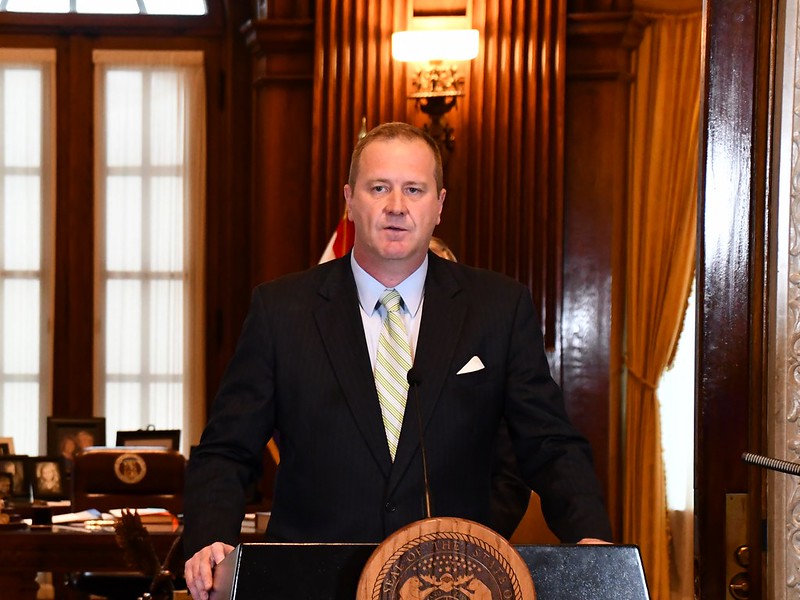AG Schmitt vows to ‘aggressively engage’ communities to sign onto settlement
Missouri could receive more than $500 million in a settlement reached with Johnson & Johnson and other opioid distributors, Attorney General Eric Schmitt announced Thursday.
That money is contingent upon every state and local government agreeing to suspend their lawsuits and sign onto the term sheets — otherwise, the amount Missouri and other states would receive decreases. States have 30 days to decide, and local governments have 150 days.
Schmitt said his office has received settlement term sheets from Johnson & Johnson and other distributors including McKesson, AmerisourceBergen, and Cardinal Health that could bring in more than $500 million. The case is one of the largest victim-centric settlements in Missouri, Schmitt said.
The attorney general said Missouri will sign onto both term sheets, and would “aggressively engage” counties to sign onto the proposal to ensure the state gets the maximum amount of money possible.
All of the money from the state’s portion of the settlement would go into an opioid abatement and treatment fund overseen by the Mental Health, Social Services, Health and Senior Services, and Public Safety departments. None of the settlement funds would be used to pay attorneys fees as Missouri did not use outside counsel, the Attorney General’s Office said.
“Opioid addiction has stolen thousands of our children, our brothers, sisters, mothers, fathers, and loved ones. It has ravaged our state and ruined lives, shattered dreams, and cut thousands of lives short,” Schmitt said. “While this proposed settlement won’t’ bring back any of these victims, today’s announcement brings the very real possibility of hundreds of millions of dollars that will go directly toward funding crucial addiction treatment, recovery, and intervention programs, providing needed resources to victims of opioid addiction and funding prevention measures.”
 Loading...
Loading...
The Attorney General’s Office also launched a “Fighting Addiction, Saving Lives” initiative to encourage counties and political subdivisions to sign onto the settlement with press events, social media campaigns, and weekly sign-on tracking.
More than 1,100 Missourians died from opioid-related causes in 2018, meaning one in every 56 deaths that year was opioid-related, according to the Department of Health and Senior Services (DHSS). The previous year, one in every 65 deaths was related to opioids.
In total, Johnson & Johnson will pay out $5 billion to all the states that agree to the terms, and the other distributors would be on the hook for $21 billion.
Johnson & Johnson has agreed to stop selling opioids entirely and will not fund any third parties’ promotion of opioids. The others have agreed to report and ban the shipping of suspicious opioid orders, establish data-driven systems to detect suspicious orders from pharmacies, and block customer pharmacies from receiving shipments if they show signs of diversion, according to the Attorney General’s Office.
“I promised to keep a victim-centered approach in all I do as attorney general, and I intend to keep that promise,” Schmitt said.
West Virginia Gov. Patrick Morrisey told NPR his state will reject the settlement and continue with its own litigation. He said the deal should have been proportioned by the severity of the opioid crisis rather than population.
In a statement, Johnson & Johnson maintained the company’s actions related to the promotion and marketing of prescription opioids were “appropriate and responsible.”
“We recognize the opioid crisis is a tremendously complex public health issue, and we have deep sympathy for everyone affected. This settlement will directly support state and local efforts to make meaningful progress in addressing the opioid crisis in the United States,” Michael Ullmann, the executive vice president and general counsel of Johnson & Johnson, said.
Amerisource Bergen, Cardinal Health, and McKesson also said they “strongly dispute the allegations made in these lawsuits” but supported the settlement as “important steps toward achieving broad resolution of governmental opioid claims and delivering meaningful relief to communities across the United States.”

Kaitlyn Schallhorn was the editor in chief of The Missouri Times from 2020-2022. She joined the newspaper in early 2019 after working as a reporter for Fox News in New York City.
Throughout her career, Kaitlyn has covered political campaigns across the U.S., including the 2016 presidential election, and humanitarian aid efforts in Africa and the Middle East.
She is a native of Missouri who studied journalism at Winthrop University in South Carolina. She is also an alumna of the National Journalism Center in Washington, D.C.
Contact Kaitlyn at kaitlyn@themissouritimes.com.

























